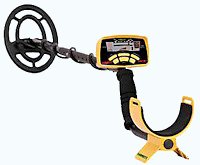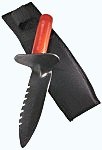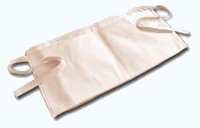|
With the many hobbies people can immerse themselves into, why would anyone choose metal detecting? To those who have never tried it, metal detecting may seem like a hobby reserved 'for the older folks', for retired people who just want to take a leisure walk on the shoreline while swinging a heavy metal box. But those who have joined the ranks of fellow metal detecting hobbyist have found it to be much more - a window to the past, a door that opens to us an opportunity to learn about our history, how people lived and interacted with each other. It offers us the chance to hold items which were long ago lost, and which can now be treasured by those who collect them. It is a hobby of discovery!
Now that you have been bitten, where to start? Here are a few basic things you will need to get you on your way to your own discoveries.
Detector

It doesn't have to be an expensive unit. There are several within the $200 to $300 price range, and they do perform quite well. The Garrett Ace 250 is one such unit.
You may now wonder what would a more expensive unit offer? You can read a more detailed explanation HERE, but in short, the higher the price the more features offered, and the more features translate to more control the user has over the machine, allowing the detectorist to fine-tune it to the various types of conditions typically encountered while detecting.
In the hands of an experienced detectorist the additional features will prove to be very useful, but the more features a machine has can also have a negative impact if the user is not familiar with the settings. One must have an understanding of what each setting change does and how it interacts with the other settings, otherwise the detector may be incorrectly tuned, resulting in decreased depth, loss of sensitivity to small targets, or repeated phantom signals.
Headphones

You can detect without headphones, but there are several good reasons for using them. One is to avoid annoying others with the detector's constant beeping while detecting at parks or any such public place. Also, much of the exterior sounds, such as wind, nearby traffic, etc, will be minimized, allowing you to concentrate on your detecting. Your batteries will last longer too! However, the best reason for using headphones is to be able to discern the faint signals of deep or small targets, allowing you to recover more items.
A digging tool

A small trowel, similar to those use for gardening can adequately do the job, though there are several specifically designed for the metal detecting hobbyist.
A finds and trash pouch

Yes, you will be digging trash. There is no getting around it. In time, though, you will find that you will dig less and less as you gain experience and an understanding of the types of signals and tones such targets generate. Many detectorists carry with them a simple carpenter's apron, using one pocket for the good finds, and the other for trash.
That's it as far as the basics to get you started in your new hobby. Have fun!
|